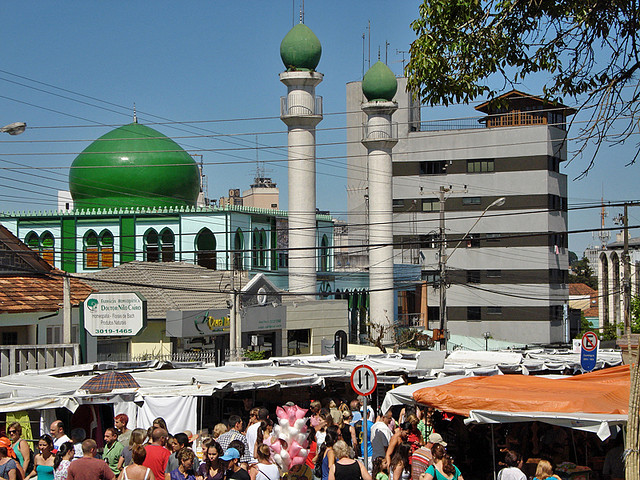By Melanie Trexler
As 16 teams reached the knockout stage of the World Cup, the blasts of canons sounded to signal the beginning of Ramadan, the holy month in the Islamic lunar calendar in which Muslims are to abstain from food, drink, smoking, sex, and gossiping from sunrise to sunset. The World Cup offers Muslims an opportunity to celebrate both their faith and fútbol with the world.
Muslim soccer players and Muslim fans inevitably are impacted. Although only two national teams from countries with a significant Muslim population (Algeria and Nigeria) competed in the knockout stage, Muslim players are also representing European nations. Islamic religious leaders have given Muslim athletes permission to abstain from fasting during Ramadan, but it remains the player’s decision.
However, Ramadan involves more than physical deprivation; it is a time of personal spiritual evaluation and renewal. Ramadan is a month of reflection in which Muslims assess their behavior in light of religious teachings with a goal of cultivating religious piety. Hardships Muslims endure during fasting (such as hunger, thirst, desire, etc.) facilitate this internal examination. In their self-reflection, Muslims consider their responsibility to follow God’s will: do good, avoid wrongdoing, strive for social justice, and seek peaceful relations with others. However, in a world filled with distractions, like the World Cup, cultivating these practices is difficult.

Feira de domingo. Curitiba – Paraná. Photo by Gilmar Mattos 2008. CC BY-NC-SA 2.0 via gijlmar Flickr.
For a small minority of ultra-conservative Muslims, soccer games are considered a “public abomination” that promote cursing, gambling, profiteering, excess partying, and hostility between fans of opposing teams. As a result, Yasser Borhami, a Salafi preacher and leader of the Egyptian al-Daawa Movement claims, “World Cup matches distract Muslims from performing their [religious] duties. They include forbidden things that could break the fast in Ramadan as well as [other forbidden things] in Islam like intolerance and wasting time.”
The vast majority of Muslims, however, reject such a position. Instead, as the Grand Imam of al-Azhar Ahmed al-Tayeb noted in a speech he submitted to World Cup officials at the invitation of Brazilian President Dilma Rousseff, the games are “an opportunity to spread peace and equality among the people, to transmit feelings of love and brotherhood, to get rid of injustice, evil and discrimination among humanity, to help the weak, the poor, the patient and the underprivileged.” The values that al-Tayeb encouraged World Cup enthusiasts to embody lie at the heart of Ramadan observance.
Brazilian Muslims are taking measures to help Muslim sports fans minimize distractions that might arise during the games (such as breaking fasts, missing prayers, and/or engaging in un-Islamic entertainment) that could hinder this self-analysis. The Federation of Muslims Associations in Brazil (FAMBRAS) printed The Guide – Muslim Fan, a 28-page booklet providing Muslim tourists with essential information about Brazil and Islam. This pamphlet includes a history of Islam in Brazil, embassy addresses of Arab and Islamic countries, and brief city profiles of game locations. Local times for the five daily prayers and addresses of mosques in each area are highlighted. In addition to the booklet, FAMBRAS operates a 12-hour telephone hotline and provides a smartphone app to offer information on halal restaurants and entertainment options. Their efforts are twofold: helping Muslims observe Islam and enjoy the World Cup.
Muslims visiting the World Cup are not alone in facing potential soccer distractions. In the Arab world, the evening hours of Ramadan are prime time for the television industry. Networks are altering programming to accommodate World Cup games broadcast in these time slots. Since kick-off times coincide with peak television viewing hours in the Middle East, Africa, and Europe, FIFA officials anticipate higher viewership for the 2014 World Cup than the 3.2 billion people who tuned in to the 2010 games. The establishment of public viewing centers in countries with large Muslim populations, such as in Indonesia, Nigeria, and Algeria, suggest additional Muslim viewers will watch this year.
Although Muslims watching these games may not overtly discuss religious themes, their friendships and engagement with others over an international sporting event provides a foundation for deeper spiritual reflections. Thus, it’s possible for Muslims to celebrate their love of fûtbol and their faith during Ramadan.
Ramadan Kareem.
Melanie Trexler is a Ph.D. candidate in theological and religious studies at Georgetown University. Originally from Richmond, Kentucky, Melanie completed her B.A. at Furman University where she double-majored in political science and religion. She continued her education at Vanderbilt University, receiving a Masters of Divinity in 2007 before entering Georgetown’s Ph.D. program in theological and religious studies with a focus in religious pluralism. She studies Islam and Christianity, concentrating on Muslim-Christian relations in the United States and in the Arab world.
Oxford Islamic Studies Online is an authoritative, dynamic resource that brings together the best current scholarship in the field for students, scholars, government officials, community groups, and librarians to foster a more accurate and informed understanding of the Islamic world. Oxford Islamic Studies Online features reference content and commentary by renowned scholars in areas such as global Islamic history, concepts, people, practices, politics, and culture, and is regularly updated as new content is commissioned and approved under the guidance of the Editor in Chief, John L. Esposito.
Subscribe to the OUPblog via email or RSS.
Subscribe to only religion articles on the OUPblog via email or RSS.
The post Fútbol and faith: the World Cup and Ramadan appeared first on OUPblog.


